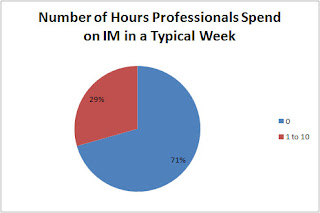I was curious about many forms of internet and cell phone communications, but I decided to focus on text messages, instant messages, emails, and phone calls. The following questions were included in my survey:
1. In a typical week, how many times do you text people from your cell phone?
2. How many characters is a typical text for you? What is typically the theme? or do you text for everything?
3. Who do you normally text?
4. In a typical week, how many personal emails do you send?
5. Who do you normally send emails to?
6. In a typical week, how much time do you spend on AIM or other chats?
7. Who do you normally talk to on AIM/chat?
8. In a typical week, how many times do you call people from your cell phone?
9. Who do you normally call?
10. What makes you call rather than text or email?

you can see that the number of texts sent for students and for professionals has approximately the same distribution. It is quite apparent though that the hours on IM vastly differ. Professionals don't seem to care for the communication that IM provides, whereas students seem to highly value this form of communication. Email was fairly distributed for both professionals and students. Students tended to send slightly fewer emails than professionals, but did not drastically differ. The number of calls made was significantly lower for students than it was for professionals. This is exactly the result I was expecting to see. My claim was that students spend more time using instant forms of text communication rather than placing phone calls. The results for IM and for phone calls seem to support this claim, though much more data and higher sample sizes would need to be taken before a final conclusion could be drawn.
While the data for questions 2, 3, 5, 7, and 9 was very interesting, question 10 gave me much insight into my claim. Many students responded that they only called home because "it's family, that's just what you do" or because "my mom forces me" or something along those lines. Students also said that they place calls for longer conversation things, but not for quick exchanges like "hey where are you?" and they would rather text or email for those exchanges. Students also say calls are used in a more urgent fashion than emails or when they can't access a computer easily. Professionals say they like the personal aspect of being able to hear another person's voice and and touched how much tone can add to a conversation. They also brought up how phone calls are more urgent. It seems that personal contacts get phone calls from professionals and business contacts get emails.
Overall, I was able to see that students spend far more time on IM and professionals make more phone calls. Everyone agrees that phone calls are more personal and better for long friendly conversations. It was interesting to study how technology has affected communication and given more time and resources, I would like to explore this topic more.







No comments:
Post a Comment